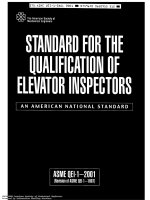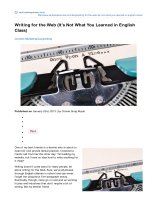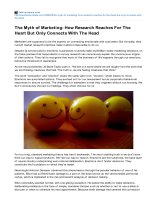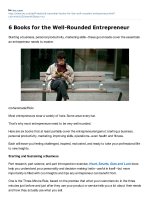Thanks for the memories cecelia ahern
Bạn đang xem bản rút gọn của tài liệu. Xem và tải ngay bản đầy đủ của tài liệu tại đây (1.14 MB, 388 trang )
♥ ♥
Cecelia
Thanks for
the Memories
♥ ♥
♥
Ahern
Dedicated, with love, to my grandparents,
Olive and Raphael Kelly and Julia and Con Ahern,
thanks for the memories
Contents
Prologue
CLOSE YOUR EYES AND STARE into the dark. 1
Part One
One Month Earlier 5
Chapter 1
BLOOD TRANSFUSION,” DR. FIELDS ANNOUNCES
from the podium of a… 7
Chapter 2
PROFESSOR HITCHCOCK.” DR. FIELDS APPROACHES
Justin, who is arranging his… 13
Chapter 3
WHAT IS IT ABOUT FART jokes, Bea?” 18
Chapter 4
IN A BLOOD DRIVE BESIDE Trinity College’s rugby
field, Justin… 23
Part Two
Present Day 27
Chapter 5
I OPEN MY EYES SLOWLY 29
Chapter 6
I WATCH THE THREE CHILDREN playing together
on the floor… 37
Chapter 7
GET A HAIRCUT! JUSTIN BLOWS the mop out of his… 48
Chapter 8
AS THE TAXI GETS CLOSER to my home in Phisboro,… 63
Chapter 9
I CAN’T FIND ANY FOOD in the apartment; we’re going… 70
Chapter 10
A GRAND CHIME WELCOMES ME to my father’s
humble
home. 82
Chapter 11
WHAT DO YOU THINK—WILL BETTY be a millionaire
by the… 88
Chapter 12
I’M ON VACATION, BRO, WHY a
re you dragging me to… 97
Chapter 13
SO, DAD, WHAT ARE YOUR plans for the day? Are… 104
Chapter 14
GOOD AFTERNOON, EVERYBODY, I’M OLAF the White,
and welcome aboard… 115
Chapter 15
MY EARS IMMEDIATELY SIZZLE AS soon as I enter the… 134
Chapter 16
DRIVING BACK TO DAD’S, I try not to glance at… 145
Chapter 17
AS I MAKE MY WAY downstairs the following morning, I… 150
Chapter 18
FRAN’S OUTSIDE, DAD. WE HAVE to go!” 159
Chapter 19
AFTER FIFTEEN MINUTES OF SITTING alone in the
sparse interrogation… 170
Chapter 20
WELL, I M
UST SAY, THAT was absolutely marvelous.
Marvelous indeed.” 179
Chapter 21
I HALF WALK, HALF RUN behind the girl with the…
192
Chapter 22
ACTUALLY, THAT’S NOT A BAD idea.” Justin stops
following the… 199
Chapter 23
I SUCCEED IN HAILI
NG A black cab, and I send… 209
Chapter 24
DAD BREATHES HEAVILY BESIDE ME and links my
arm tightly… 219
Chapter 25
DURING THE STANDING OVATION, JUSTI
N
spies Joyce’s father helping her… 231
Chapter 26
BACK IN OUR HOTEL ROOM it’s lights-out for Dad, who… 239
Chapter 27
OKAY, I’VE GATHERED US ALL here today because—” 245
Chapter 28
JUSTIN POWER-WALKS THROUGH THE HALLS of the
National Gallery, part… 255
Chapter 29
JUSTIN LOOKS TO HIS BROTHER in panic and
searches quickly… 266
Chapter 30
I LIE IN THE TRASH b
in, breathless, my heart beating… 273
Chapter 31
AT SEVEN FIFTEEN THE NEXT morning, just before
Justin leaves… 280
Chapter 32
WHERE ON EARTH HAVE YOU been?
What happened
to you,… 287
Chapter 33
JUSTIN WALKS THROUGH ARRIVALS AT Dublin
Airport on Tu
esday morning… 295
Chapter 34
SO HOW DID IT GO?” Thomas the driver asks as… 309
Chapter 35
WHAT’S THAT?” 317
Chapter 36
HE WANTS TO MEET ME,” I tell Kate nervously as… 325
Chapter 37
I’M ON MY WAY IN TO the city to meet… 330
Chapter 38
WHAT THE HELL DID YOU do that for, Doris?” Justin… 338
Chapter 39
I STEP OUT OF THE taxi at Stephen’s Green and… 342
Chapter 40
I RUN DOWN THE HOSPITAL corridors, examining each
door, trying… 351
Chapter 41
JUSTIN FINISHES EXPLAINING THE STORY of his
disastrous weekend to… 353
Chapter 42
I LIE IN BED STARING at the ceiling. Dad is… 358
Part Three
One Month Later 363
Chapter 43
NEXT TIME WE SHOULD TAKE the car, Gracie,”
Dad says… 365
Acknowledgments
Sources
About the Author
Other Books by Cecelia Ahern
Credits
Cover
Copyright
About the Publisher
Prologue
C
l ose y our e yes and s tare into the dark.
My father’s advice when I couldn’t sleep as a little girl.
He wouldn’t want me to do that now, but I’ve set my mind to
the task regardless. I’m staring into that immeasurable blackness
that stretches far beyond my closed eyelids. Though I lie still on
the ground, I feel perched at the highest point I could possibly be;
clutching at a star in the night sky with my legs dangling above
cold black nothingness. I take one last look at my fingers wrapped
around the light and let go. Down I go, falling, then floating, and,
falling again, I wait for the land of my life.
I know now, as I knew as that little girl fighting sleep, that
behind the gauz
ed screen of shut-eye lies color. It taunts me, dares
me to open my eyes and lose sleep. Flashes of red and amber, yel
-
low and white, speckle my darkness. I refuse to open them. I rebel,
and I squeeze my e
yelids together tighter to block out the grains of
light, mere distractions that keep us awake, but a sign that there’s
life beyond.
But there’s no life in me. None that I can feel, from where I
lie at the bottom of the stair
case. My heart beats quicker now, the
2 / Cecelia Ahern
lone fighter left standing in the ring, a red boxing glove pumping
victoriously into the air, refusing to give up. It’s the only part of me
that cares, the only part that ever cared. It fights to pump the blood
around to heal, to replace what I’m losing. But it’s all leaving my
body as quickly as it’s sent; forming a deep black ocean of its own
around me where I’ve fallen.
Rushing, rushing, rushing. We are always rushing. Never have
enough time here, al
ways trying to make our way there. Need to
have left here five minutes ago, need to be there now. The phone
rings again, and I acknowledge the irony. I could have taken my
time and answered it now.
Now, not then.
I could have taken all the time in the world on each of those
steps. But w
e’re always rushing. All but my heart. That slows now.
I don’t mind so much. I place my hand on my belly. If my child
is gone, and I suspect this is so, I’ll join it there. There . . . where?
Wherever. It; a heartless word. He or she so young; who it was to
become, still a question. But there, I will mother it.
There, not here.
I’ll tell it: I’m sorry, sweetheart, I’m sorry I ruined your
chances
, my chance—our chance of
a life together. But close your
eyes and stare into the darkness now, like Mummy is doing, and
we’ll find our way together.
There’s a noise in the room, and I feel a presence.
“Oh God, Joyce, oh God. Can you hear me, love? Oh God. Oh
God. Oh, please no, good Lor
d, not my Joyce, don’t take my Joyce.
Hold on, love, I’m here. Dad is here.”
I don’t want to hold on, and I feel like telling him so. I hear
myself g
roan, an animal-like whimper, and it shocks me, scares
me. I have a plan, I want to tell him. I want to go; only then can I
be with my baby.
Then, not now.
He’s stopped me from falling, but I haven’t landed yet. Instead
thanks for the memories / 3
he helps me balance on nothing, hover while I’m forced to make
the decision. I want to keep falling, but he’s calling the ambulance
and he’s gripping my hand with such ferocity it’s as though it is he
who is hanging on to dear life. As though I’m all he has. He’s brush
-
ing the hair from my forehead and weeping loudly. I’ve never heard
him w
eep
. Not even when Mum died. He clings to my hand with
all of the strength I never knew his old body had, and I remember
that I am all he has and that he, once again just like before, is my
whole world. The blood continues to rush through me. Rushing,
rushing, rushing. We are always rushing. Maybe I’m rushing again.
Maybe it’s not my time to go.
I feel the rough skin of old hands squeezing mine, and their
intensity and their familiarity f
orce me to open my eyes. Light fills
them, and I glimpse his face, a look I never want to see again. He
clings to his baby. I know I’ve lost mine; I can’t let him lose his. In
making my decision, I already begin to grieve. I’ve landed now, the
land of my life. And still, my heart pumps on.
Even when broken, it still works.
pa r t o n e
One Month Earlier
Chapter 1
B
l o od tr ansfusio n,” Dr. Fields announces from
the podium of a lecture hall in Trinity College’s Arts Build-
ing, “is the process of transferring blood or blood-based prod-
ucts from one person into the circulatory system of another.
Blood tr
ansf
usions may treat medical conditions such as massive
blood loss due to trauma, surgery, shock, and where the red-cell-
producing mechanism fails.
“Here are the facts. Three thousand donations are needed in
Ireland e
very week. Only three percent of the Irish population are
donors, providing blood for a population of almost four million.
One in four people will need a transfusion at some point. Take a
look around the room now.”
Five hundred heads turn left, right, and around. Uncomfort-
able sniggers break the silence.
Dr. Fields elevates her voice over the disruption. “At least one
hundr
ed and f
ifty people in this room will need a blood transfusion
at some stage in their lives.”
That silences them. A hand is raised.
“Yes?”
8 / Cecelia Ahern
“How much blood does a patient need?”
“How long is a piece of string, dumb-ass?” a voice from the
back mocks
, and a scrunched ball of paper flies at the head of the
young male inquirer.
“It’s a very good question.” She frowns into the darkness, un-
able to see the students through the light of the projector. “Who
asked that?”
“Mr. Dover,” someone calls from the other side of the room.
“I’m sure Mr. Dover can answer for himself. What’s your first
name?”
“Ben,” he responds, sounding dejected.
Laughter erupts. Dr. Fields sighs.
“Ben, thank you for your question—and to the rest of you,
ther
e is no such thing as a stupid question. T
his is what Blood for
Life Week is all about. It’s about asking all the questions you want,
learning all you need to know about blood transfusions before you
possibly donate today, tomorrow, the remaining days of this week
on campus, or maybe regularly in your future.”
The main door opens, and light streams into the dark lecture
hall. J
ustin Hitchcock enter
s, the concentration on his face illu-
minated by the white light of the projector. Under one arm are
m
ultiple piles of
folders, each one slipping by the second. A knee
shoots up to hoist them back in place. His right hand carries both
an overstuffed briefcase and a dangerously balanced Styrofoam
cup of coffee. He slowly lowers his hovering foot down to the
floor, as though performing a tai chi move, and a relieved smile
creeps onto his face as calm is restored. Somebody sniggers, and
the balancing act is once again compromised.
Hold it, Justin. Move your eyes away from the cup and assess
the situation. W
oman on podium, f
ive hundred kids. All staring at
you. Say something. Something intelligent.
“I’m confused,” he announces to the darkness, behind which
he senses some sor
t of
life-form. There are twitters in the room,
thanks for the memories / 9
and he feels all eyes on him as he moves back toward the door to
check the number.
Don’t spill the coffee. Don’t spill the damn coffee.
He opens the door, allowing shafts of light to sneak in again,
and the students in its line shade their e
y
es.
Twitter, twitter, nothing funnier than a lost man.
Laden down with items, he manages to hold the door open
with his leg. He look
s back to the number on the outside of the
door and then back to his sheet, the sheet that, if he doesn’t grab
it that very second, will float to the ground. He makes a move to
grab it. Wrong hand. Styrofoam cup of coffee falls to the ground.
Closely followed by sheet of paper.
Damn it! There they go again, twitter, twitter. Nothing fun-
nier than a lost man who has spilled his coffee and dropped his
schedule.
“Can I help you?” The lecturer steps down from the podium.
Justin brings his entire body back into the classroom, and
darkness r
esumes
.
“Well, it says here . . . well, it said there”—he nods his head
tow
ard the sodden sheet on the ground—“that I have a class here
now.”
“Enrollment for international students is in the exam hall.”
He frowns. “No, I—”
“I’m sorry.” She comes closer. “I thought I heard an American
accent.” She pick
s up the Styrof
oam cup and throws it into the bin,
over which a sign reads “No Drinks Allowed.”
“Ah . . . oh . . . sorry about that.”
“Graduate students are next door.” She adds in a whisper,
“T
r
ust me, you don’t want to join this class.”
Justin clears his throat and corrects his posture, tucking the
folder
s tighter under his arm. “Actually, I’m lecturing the History
of Art and Architecture class.”
“You’re lecturing?”
10 / Cecelia Ahern
“Guest lecturing. Believe it or not.” He blows his hair up from
his sticky forehead. A haircut, remember to get a haircut. There
they go again, twitter, twitter. A lost lecturer who’s spilled his cof
-
fee, dropped his schedule, is about to lose his folders, and needs a
haircut. Def
initely nothing funnier.
“Professor Hitchcock?”
“That’s me.” He feels the folders slipping from under his arm.
“Oh, I’m so sorry,” she whispers. “I didn’t know . . .” She
catches a f
older f
or him. “I’m Dr. Sarah Fields from the IBTS. The
faculty told me that I could have a half hour with the students be
-
fore your lecture, your permission pending, of course.”
“Oh, well, nobody informed me of that, but that’s no prob-
lemo.” Problemo? He shakes his head at himself and makes for the
door
. Starb
ucks, here I come.
“Professor Hitchcock?”
He stops at the door. “Yes.”
“Would you like to join us?”
I most certainly would not. There’s a cappuccino and cinna-
mon muffin with my name on them. No. Just say no.
“Um . . . nn-es.” Nes? “I mean yes.”
Twitter, twitter, twitter. Lecturer caught out. Forced into do-
ing something he clearly didn’t want to do by attractive young
w
oman in w
hite coat claiming to be a doctor of an unfamiliar ini-
tialized organization.
“Great. Welcome.”
She places the folders back under his arm and returns to the
podium to addr
ess the students
.
“Okay, attention, everybody. Back to the initial question of
blood quantities
. A car accident victim may require up to thirty
units of blood. A bleeding ulcer could require anything between
three and thirty units of blood. A coronary artery bypass may use
between one and five units of blood. It varies, but with such quan
-
tities needed, now you see why we always want donors.”
thanks for the memories / 11
Justin takes a seat in the front row and listens with horror to
the discussion he’s joined.
“Does anybody have any questions?”
Can you change the subject?
“Do you get paid for giving blood?”
More laughs.
“Not in this country, I’m afraid.”
“Does the person who is given blood know who their
donor is?”
“Donations are usually anonymous to the recipient, but prod-
ucts in a blood bank are always individually traceable through the
c
y
cle of donation—testing, separation into components, storage,
and administration to the recipient.”
“Can anyone give blood?”
“Good question. I have a list here of donor disqualifications.
Please all study it car
ef
ully, and take notes if you wish.” Dr. Fields
places her sheet under the projector, and her white coat lights up
with a rather graphic picture of someone in dire need of a dona
-
tion. She steps away, and it fills the screen on the wall.
People groan and the word “gross” travels around the tiered
seating like a w
a
ve. Twice by Justin. Dizziness overtakes him, and
he averts his eyes from the image.
“Oops, wrong sheet,” Dr. Fields says cheekily, slowly replac-
ing it with the promised list.
Justin searches with great hope for needle or blood phobia in
an ef
f
ort to eliminate himself as a possible blood donor. No such
luck—not that it matters, as the chances of him donating a drop of
blood to anyone are as rare as ideas in the morning.
“Too bad, Dover.” Another scrunched ball of paper goes fly-
ing from the back of the hall to hit Ben’s head again. “Gay people
can’
t donate.”
Ben coolly raises a middle finger in the air.
“That’s discriminatory,” one girl calls out.
12 / Cecelia Ahern
“It is also a discussion for another day,” Dr. Fields responds,
moving on. “Remember, your body will replace the liquid part of
the donation within twenty-four hours. With a unit of blood at al
-
most a pint, and everyone having eight to twelve pints of blood in
their body, the a
verage person can easily spare giving one.”
Pockets of juvenile laughter at the innuendo.
“Everybody, please.” Dr. Fields claps her hands, trying desper-
ately to get attention. “Blood for Life Week is all about education
as m
uch as donation. It
’s all well and good that we can have a laugh
and a joke, but at this time I think it’s important to note the fact
that someone’s life, be it woman, man, or child, could be depend
-
ing on you right now.”
How quickly silence falls upon the class. Even Justin stops
talk
ing to himself.
Chapter 2
P
r ofessor Hit chc o ck.” Dr. Fields appr oaches Jus-
tin, who is arranging his notes at the podium while the stu-
dents take a five-minute break.
“Please call me J
ustin, Doctor
.”
“Please call me Sarah.” She holds out her hand.
“Nice to meet you, Sarah.”
“I just want to make sure we’ll see each other later?”
“Later?”
“Yes, later. As in . . . after your lecture.” She smiles.
Is she flirting? It’s been so long, how am I supposed to tell?
Speak, Justin, speak.
“Great. A date w
ould be great.”
She purses her lips to hide a grin. “Okay, I’ll meet you at the
main entrance at six, and I’ll bring you across myself.”
“Bring me across wher
e?”
“To where we’ve got the blood drive set up. It’s beside the
rugby pitch, but I’d prefer to bring you over myself.”
“The b
lood drive . . .” He’s immediately flooded with dread.
“Ah, I don’t think that—”
14 / Cecelia Ahern
“And then we’ll go for a drink after?”
“You know what? I’m just getting over the flu, so I don’t think
I’m eligib
le for donating.” He parts his hands and shrugs.
“Are you on antibiotics?”
“No, but that’s a good idea, Sarah. Maybe I should be . . .” He
rubs his throat.
“Oh, I think y
ou’ll be okay.” She laughs.
“No, you see, I’ve been around some pretty infectious dis-
eases lately. Malaria, smallpox, the whole lot. I was in a very tropi-
cal area.” He remembers the list of contraindications. “And my
brother
, Al? Y
eah, he’s a leper.” Lame, lame, lame.
“Really.” She lifts an eyebrow, and though he fights it with all his
will, he crack
s a smile. “How long ago did you leave the States?”
Think hard, this could be a trick question. “I moved to Lon-
don three months ago,” he finally answers truthfully.
“Oh, lucky for you. If it was two months, you wouldn’t be
elig
ib
le.”
“Now hold on, let me think . . .” He scratches his chin and
randoml
y mumbles months of the year aloud. “Maybe it was two
months ago. If I work backward from when I arrived . . .” He trails
off while counting his fingers and staring off into the distance with
a concentrated frown.
“Are you afraid, Professor Hitchcock?” She smiles.
“Afraid? No!” He throws his head back and guffaws. “But did
I mention I hav
e malaria?” He sighs at her failure to take him seri-
ously. “Well, I’m all out of ideas.”
“I’ll see you at the entrance at six. Oh, and don’t forget to eat
bef
or
ehand.”
“Of course, because I’ll be ravenous before my date with a gi-
ant homicidal needle,” he grumbles as he watches her leave.
The students begin filing back into the room, and he tries to
hide the smile of
pleasur
e on his face, mixed as it is. Finally the
class is his.
thanks for the memories / 15
Okay, my little twittering friends. It’s payback time.
They’re not yet all seated when he begins.
“Art,” he announces to the lecture hall, and he hears the
sounds of
pencils and notepads being e
xtracted from bags, loud
zips and buckles, tin pencil cases rattling; all new for the first day.
Squeaky-clean and untarnished. Shame the same cannot be said
for the students. “The products of human creativity.” He doesn’t
stall to allow them time to catch up. In fact, it’s time to have a little
fun. His speech speeds up.
“The creation of beautiful or significant things.” He paces as
he speak
s
, still hearing zipping sounds and rattling.
“Sir, could you say that again ple—”
“No,” he interrupts. “Engineering,” he moves on, “the practi-
cal application of science to commerce or industry.” Total silence
no
w
.
“Creativity and practicality. The fruit of their merger is archi-
tecture.”
Faster, Justin, faster!
“Architecture-is-the-transformation-of-ideas-into-a-phys-
ical-r
eality
. The-complex-and-caref ully-designed-structure-
of-something-especially-with-regard-to-a-specif ic-period.
To-understand-architecture-we-must-examine-the-relationship-
between-technology-science-and-society.”
“Sir, can you—”
“No.” But he slows slightly. “We examine how architecture
through the centuries has been sha
ped b
y society, how it continues
to be shaped, but also how it, in turn, shapes society.”
He pauses, looking around at the youthful faces staring up
at him, their minds empty v
essels w
aiting to be filled. So much
to learn, so little time to do it in, so little passion within them to
understand it truly. It is his job to give them passion. To share with
them his experiences of travel, his knowledge of all the great mas-
terpieces of centuries ago. He will transport them from the stuffy









